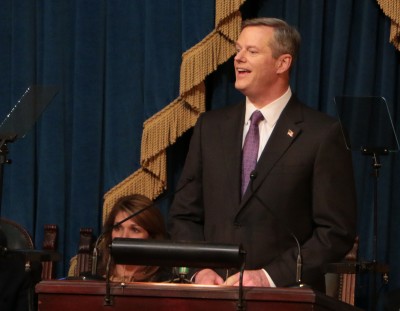
Advocating for an increase in high-quality career education programs for Massachusetts citizens, the Baker-Polito Administration announced Friday an $83.5 million for career vocational technical education, according to a Friday press release.
The funding for the 2017 fiscal year budget will be coupled with a substantial capital grant program for vocational equipment to further show the administration’s interest in developing local workforces and employment partnerships, according to the release.
Massachusetts Gov. Charlie Baker said in the release that increasing vocational education would help strengthen the relationship between schools and businesses in Massachusetts.
“With too many good-paying jobs going unfilled, we are pleased to announce this critical investment in our career and technical schools,” Baker said in the release. “Our proposal will make it possible for more students to explore a pathway to success through stronger partnerships with our schools and local businesses in the commonwealth.”
Colleen Quinn, spokesperson for the Office of Labor and Workforce Development, wrote in an email that funding will be broken down to benefit specific recipients such as school-to-career preparation activities, dual enrollment programs, technical partnership grants and equipment for career technical education programs.
Quinn told The Daily Free Press that Baker emphasized the importance of vocational education because vocational careers are showing trends of higher demand.
“There is going to be a shortage of people in many different sectors, from plumbing to high-tech precision manufacturing, when the baby boomers retire,” Quinn said. “It is a very important issue for [Baker], and it is something that he charges three of his cabinet secretaries with to take a look at and see what they could do to further the mission of vocational schools across the state.”
Quinn said the program is being supported across Baker’s entire administration in order to successfully implement such a large-scale program.
“Well, this plan is an initiative across the three secretariats,” Quinn said. “Gov. Baker appointed his education secretary, his labor and workforce development secretary and his housing and economic recovery secretary to all work very closely together to make sure that all programs are meeting the people’s needs across all three secretariats.”
Several Boston residents said they were optimistic about the role vocational education could play in the betterment of the lives of workers.
Cody Tippins, 22, a vocational student from Dorchester, said the program was a necessary boost for people who do not necessarily want a college degree.
“The money will not be wasted, it will be put to good use,” Tippins said. “Technical schools are a big necessity nowadays, as a degree is not needed to do everything. I mean, most people coming out of high school have this mentality that they have to go to college, but not everyone can do that. There have to be some hands-on people in the world.”
Dario Sanchez, 20, of Kenmore, said he agrees with the decision to fund vocational training and thinks that vocational careers are a viable substitute to a college education.
“Vocational training is a good thing,” Sanchez said. “I think it is a good alternative to the traditional four-year model, which doesn’t make sense for a lot of people.”
However, Paul Preston, 48, of Brighton, said he was concerned that vocational funding might take away from other worthy programs.
“I think where the money is coming from is important to see,” Preston said. “[I wonder] if there is any other way to fund the technical schools.”













